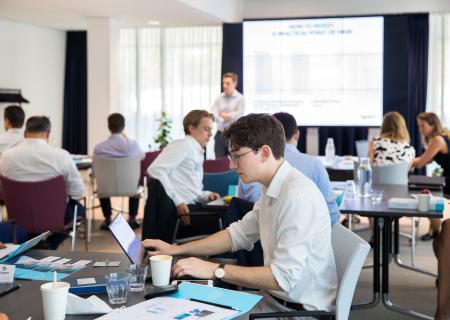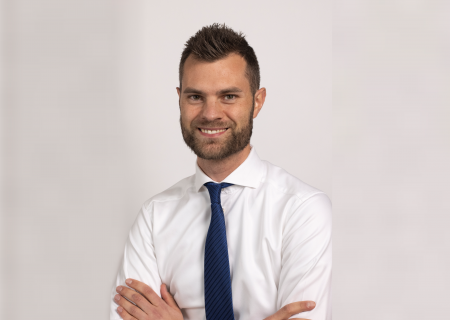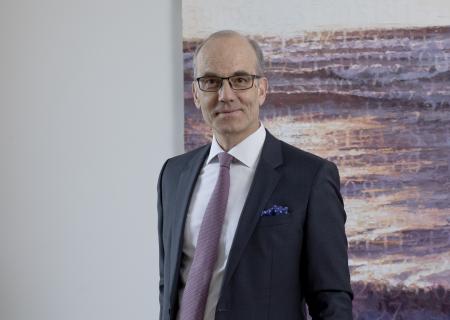Member Profile: Thomas Kallenbrunnen
From property as a financial asset to ‘real estate as a business’
Thomas Kallenbrunnen recently took time out with IQ Magazine to discuss his new role as Managing Director at GARBE Institutional Capital and why he believes INREV will continue to play an important part in the evolution of European real estate investment.
‘Our immediate ambition can be summed up as “Beyond logistics”,’ he explains. ‘GARBE started out as a developer of German residential real estate in the 1960s but since then has expanded into commercial and most notably logistics and industrial real estate. In this asset class an integrated development and investment management platform has been built very successfully across Europe. Until recently, the focus of the investment management activities has remained logistics, but now the plan is to diversify much more widely across different sectors as well as to build a truly pan-European platform.’
‘GARBE still has logistics at its heart, but we are very much a vertically integrated operation, reflecting the nature of real estate as an asset class. As a developer and investment manager we have two customers – the investor and the asset occupier – and we are strongly committed to meeting the needs of each.’
As a developer and investment manager we have two customers – the investor and the asset occupier – and we are strongly committed to meeting the needs of each
During the interview Thomas also highlighted three themes that the business has identified as key to its future progression: residential, science & technology real estate and urban redevelopment. ‘Residential is a sector where the idea of customer focus is particularly relevant,’ he says. ‘This approach is different from what often happened in the past, for instance in Germany, but the concept of “property as a service” – which was also covered in a recent INREV paper – makes a lot of sense here. Our residential activities are pan-European in nature and we will invest only where we have true boots on the ground - in Germany, the Netherlands and France, and also in the UK, Spain and in Central and Eastern European markets.’
Moving on to the theme of technology, Thomas sees this as critical especially in the context of the climate agenda. ‘While the investment industry has become adept at measuring the financial performance of assets in a relatively straightforward way through measures like total return, it is more challenging to measure carbon emissions and to set effective KPI’s in this area. Technology advances such as smart metering are now making this more feasible, but there still needs to be agreement on defining the most appropriate measures to use – especially to develop a user-centric ESG approach that is about achieving real progress and not just about compliance. This is an area where INREV has a big role to play in ensuring that best practices are defined especially in the context of institutional funds. For GARBE, this doesn’t just relate to emissions generated in the use of buildings, but also the carbon embedded in the construction process.’
While the investment industry has become adept at measuring the financial performance of assets in a relatively straightforward way through measures like total return, it is more challenging to measure carbon emissions and to set effective KPI’s in this area
‘Urban redevelopment is another major theme because of the big changes now taking place in how real estate is used,’ Thomas continues. ‘Clearly the pandemic has massively accelerated already existing trends like ecommerce and shifting patterns of work, but we expect such technology-driven disruption to continue. We also believe there will be a move towards medium density cities in the longer term reflecting a new work-life balance. All these trends suggest that the next decade will be one of high capex – in the past it was possible to just buy and hold, but now assets will need to be managed actively to stay relevant to occupiers and also to meet the demands of the ESG agenda. We are acutely aware of this in our residential endeavours, as this sector is highly end-user centric.’
How does INREV fit into this vision of the future? Thomas sees it playing a major role in helping to develop governance structures for the new types of funds evolving in this fast changing market place. ‘The situation that favours active asset management means that the funds, club deals and vehicles involved are not just offering investors traditional asset management services. This is not only a move towards real estate as a service but real estate as a business. So there will be new relationships between the investor, the developer and the operating property manager. How should fees be charged and performance rewarded in such cases? We are now creating develop-to-hold funds which have a hybrid capital base with different risk-return profiles at various stages of the fund’s life, something that is difficult to govern. At present, organisations like ourselves are working out ways of putting such ideas into practice’. INREV has already started to study this evolution and issued a research paper, ‘Operational Real Estate: Real Asset of Real Economy?’ on the characteristics of operational real estate in Europe and implications for the investment approach in terms of objectives, structure, and resource requirements. This year, INREV will continue to explore further the operational real estate topic and look at the governance and operations of integrated investment vehicles.
‘This could have parallels with the work of INREV’s Secondary Markets and Liquidity Committee [which Thomas chaired] that has now been wound up, having achieved its goals of creating standards and transparency for secondary transactions in funds across Europe. In particular, its guidelines for best practice in the governance of European open end funds’ liquidity played a pivotal role in the creation of the market for these kinds of funds.’
Thomas Kallenbrunnen is Managing Director at GARBE Institutional Capital and past Chair of the INREV Secondary Markets and Liquidity Committee.






